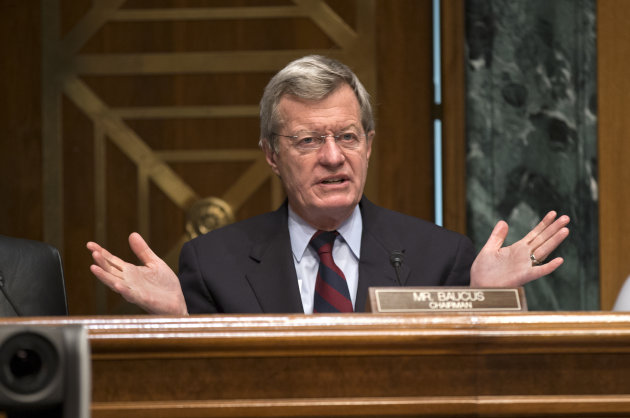-

Senate Finance Committee Chairman Sen. Max Baucus, D-Mont. questions Health and Human Services Secretary Kathleen Sebelius as she testifies on Capitol Hill in Washington, Wednesday, April …more 17, 2013, before the committee’s hearing on President Barack Obama’s budget proposal for fiscal year 2014. (AP Photo/J. Scott Applewhite) less
“I just see a huge train wreck coming down,” Senate Finance Committee Chairman Max Baucus, D-Mont., told Obama’s health care chief during a routine budget hearing that suddenly turned tense.
Baucus is the first top Democrat to publicly voice fears about the rollout of the new health care law, designed to bring coverage to some 30 million uninsured Americans through a mix of government programs and tax credits for private
insurance that start next year. Polls show the public remains confused by the complexity of the law, and even many uninsured people are skeptical that they will be helped.
A six-term Democrat, Baucus expects to face a tough re-election in 2014. He’s still trying to recover from approval ratings that nosedived amid displeasure with the health care law in his home state.
Normally low-key and supportive, Baucus challenged Health and Human Services Secretary Kathleen Sebelius at Wednesday’s hearing.
He said he’s “very concerned” that new health insurance marketplaces for consumers and small businesses will not open on time in every state, and that if they do, they might just flop because residents don’t have the information they need to make choices.
“The administration’s public information campaign on the benefits of the Affordable Care Act deserves a failing grade,” he told Sebelius. “You need to fix this.”
Responding to Baucus, Sebelius pointedly noted that Republicans in Congress last year blocked funding for carrying out the health care law, and she had to resort to raiding other departmental funds that were legally available to her.
The administration is asking for $1.5 billion in next year’s budget, and Republicans don’t seem willing to grant that, either.
At one point, as Sebelius tried to answer Baucus’ demand for facts and figures, the senator admonished: “You haven’t given me any data; you just give me concepts, frankly.”
“I don’t know what he’s looking at,” Sebelius told reporters following her out of the room after Baucus adjourned the hearing. “But we are on track to fully implement marketplaces in Jan. 2014, and to be open for open enrollment.”
That open-enrollment launch is only months away, Oct. 1. It’s when millions of middle-class consumers who don’t get coverage through their jobs will be able to start shopping for a private plan in the new marketplaces, or exchanges. They’ll also be able to find out if they qualify for tax credits that will lower their premiums. At the same time, low-income people will be steered to government programs, mainly an expanded version of Medicaid.
But half the states, most of them Republican-led, have refused to cooperate in setting up the infrastructure of Obama’s law. Others, like Montana, are politically divided. The overhaul law provided that the federal government would step in and run the new markets if a state failed to do so. Envisioned as a fallback, federal control now looks like it will be the norm in about half the country, straining resources.
Administration officials say their public outreach campaign will begin in earnest over the summer. They question the wisdom of bombarding consumers with insurance details now, when there’s not yet anything to sign up for. Baucus said in his state, that vacuum has mostly been filled by misinformation.
While some other Democratic lawmakers have privately voiced similar frustrations, most have publicly lauded Sebelius for her department’s work. Democrats from reliably blue states have less to worry about, since their governors and legislatures have embraced the law and are working to make it succeed.
In Montana, the legislature rejected Democratic Gov. Steve Bullock’s bid for a state-run insurance market. The governor is now trying to find a compromise on expanding Medicaid.
Republicans are certain to remind Montana voters next year that Baucus’ fingerprints are all over the health care law, even though a similar strategy failed to knock off fellow Democratic Sen. Jon Tester last year.
After the hearing, Baucus’ office clarified that he still thinks the Affordable Care Act is a good law, but he questions how it is being carried out.

